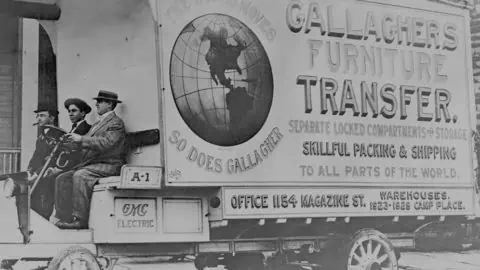The (Un-Criminal) World of Hostage-Taking Movers
Posted in: I'm a Mover, Moving Industry News, Regulations[Synopsis: Fraud and deception runs rampant in our industry. Why isn’t more being done?]
We bust our butts to do our jobs well, to treat our customers right and give our industry a good name. But we still hear about swindles, scams and those customers standing out in their own driveway facing a hostage situation. To those lucky enough to not know what I mean…
Hostage situation: A mover has your stuff and won’t give it back but under certain conditions.
How do these guys get away with it? They’re relentless. (And almost as successful as the fraudsters running that Nigerian Prince e-mail scheme.)
Here are the two fundamental aspects to the problem
1. No one knows the difference
The first issue is the under-education of the general public. In other words, fraudsters regularly gain opportunities when people do these things:
- Pay large amounts of cash up front
- Fail to check their movers’ credentials (i.e. their registration with the state or the DOT)
- Hire movers blindly through generic website listings
The only silver lining to all these hostage stories is that maybe more and more people will catch onto the idea that you can’t just hire any random stranger who calls themselves a mover.
2. The laws haven’t caught up
The second aspect of this problem is the inability of our law enforcement community to put the clampdown on these guys.
This is not for a lack of effort. Check out this recent case where perpetrators were prosecuted and sentenced for conspiring to fraudulently obtain household goods. An investigation led police to two storage facilities in Georgia filled with several victims’ belongings.
Says U.S. Attorney John Horn of this one example:
“…since at least November 2013, Pickett and Giles have been traveling the United States, picking up shipments of innocent victims’ personal property, and promising to deliver those shipments to agreed-upon locations. But instead of delivering the property, Pickett and Giles would take control of the property, keeping some of it for themselves and disposing of the rest.”
“Traveling the United States” sounds like they were in touch with one or more of the “move brokers” we also hear about. What’s a “mover broker”?
There are people heading these operations who advertise moving services, give low-ball estimates over the phone, charge a deposit, then farm the job out to the highest bidder. Then “movers” will load up the unwitting victim’s stuff (often into a rental truck) and then jack up the price until they give it back, if they don’t just steal the stuff outright.
Loopholes around (non) laws
One obstacle to fighting such a scammer is outlined here by our friends over at MovingScam:
“Strictly speaking, since your move involves a contract between you and your moving company (the Bill of Lading), it is a civil matter, not a criminal matter and as such, the police can’t get involved.”
A spokesman over at Sparefoot adds that the police can only step in if a local or state law has been broken.
But this doesn’t mean the local police have never stepped up. Last year a woman called the cops on the men who moved her from Indiana to Arizona when they tried to double the price of her move and threatened to keep her belongings. The police made a brilliant move by calling the state’s Department of Weights and Measures who ordered a reweigh of the shipment, resulting in the woman only having to pay what was originally agreed upon.
So there are ways around non-enforcement. Says New Jersey’s Acting Attorney General John Hoffman,
“A lot of predatory movers are not licensed, they are not accountable to the state,” he said. “One of the things we are concerned about is that movers essentially hold possessions to ransom, to get more money. They say ‘You’ve got to pay us more, or we are not going to unload. We are going to take your stuff away’… What we are trying to do is hold these unlicensed movers accountable.”
It turns out that enforcing licensing laws after complaints are filed is the best way to help stop movers holding items ransom. But the problem that it’s necessary for some people to fall victim to these guys before the authorities can track them down is huge.
And because they are only getting busted for licensing they usually only have to pay a fine, get registered (getting their fine halved in the process), or if they want, simply quit the “moving business”.
There oughta be a law about that
Holding items has been a federal statute since the “Safe, Accountable, Flexible, Efficient Transportation Equity Act: A Legacy for Users” became enacted back in 2005. The SAFETEA-LU defines “failure to give up possession of household goods” as:
“…the knowing and willful failure, in violation of a contract, to deliver to or unload at, the destination of a shipment of household goods for which charges have been estimated by the carrier and for which the shipper has tendered payment.”
“Okay, so if this is a federal law, why are there still so many hostage situations?”, you ask.
HireAHelper implements a live rankings board of a vast network of professional movers. The moving companies who provide reliable, safe services (and get great reviews!) move up to the top of the list, making HireAHelper the home of the best and most vetted network of professional movers in the country!
The first issue with this law is that the Feds can only get involved if the move has gone interstate. Even then, they hardly have the resources to run out to someone’s driveway every time another hostage situation pops up. And that’s just for the times when the customer/victim would even know enough about the SAFETEA-LU to notify the feds. (So, like, never.)
The lack of federal government intervention runs even deeper than this. There’s a lot of fancy sounding names to go over, but I promise it’s simpler than it sounds.
Speaking before the U.S. Senate in 2012, Federal Motor Carrier Safety Administration (FMCSA) administrator Anne Ferro had little more to say on the issue other than “the FMCSA is working hard” to combat the problem of hostage loads, and that they “attempt to address each and every hostage load complaint with some level of investigation.” (Begins on Page 7 of the PDF.)
So while we have no reason to doubt the FMCSA’s desire to combat the ongoing problems out there, the question of whether they even have the ability to do anything remains in play.
This Moving Company Guide tells us that pursuant to the Congressional ICC Termination Act of 1995, the FMCSA is specifically prohibited from intervening in resolving individual complaints. So this means that the FMCSA can’t and won’t really do much unless you are dealing with a company for whom they’ve already had a string of complaints.
Even if the moving victim jumps through all the hoops the FMCSA lays out in their Dispute Settlement Program, the Administration admits they have no authority to enforce a court judgment.
What does that all mean? Basically…”Uh, we’re working on it.”
So is hostage-taking beyond the scope of local and state criminal laws?
Strictly speaking…maybe.
Calling the police may or may not help, since the best they can do if no laws pertaining to their limited jurisdiction have been broken and the move is intrastate is call the Department of Weights and Measures.
But things are slowly changing, state by state.
Houston’s ABC-13 reports in a 2012 piece that a new Texas law would make it easier for law enforcement officers to stop hostage holders in their tracks. “Now the police can charge movers with a crime if they jack up the cost of a move after loading a person’s goods onto a truck,” says Executive Director of the Southwest Houston Movers Association John Esparza.
It ultimately all comes back to that crucial piece of paper called the Bill of Lading which, as a contract, has civil but not criminal implications. The harsh reality is that it is currently up to the customer to be aware of their rights and responsibilities when they are hiring someone to move their belongings. This is one big reason moving companies are required to provide their customers with that always aptly-named pamphlet “Your Rights and Responsibilities”.
But all is not lost, even to the unaware. A couple of years ago a formal civil complaint was filed against two men in New Jersey, and the New Jersey’s Division of Consumer Affairs reached a settlement with the perpetrators to the tune of $360,000.
Perhaps this kind of splashy news will become more common until it becomes more rare. Until then, the best we can aim for is a more educated and aware general public. You are not to blame if your stuff is being held hostage, but still try to maintain high standards on who you hire until the law catches up.









